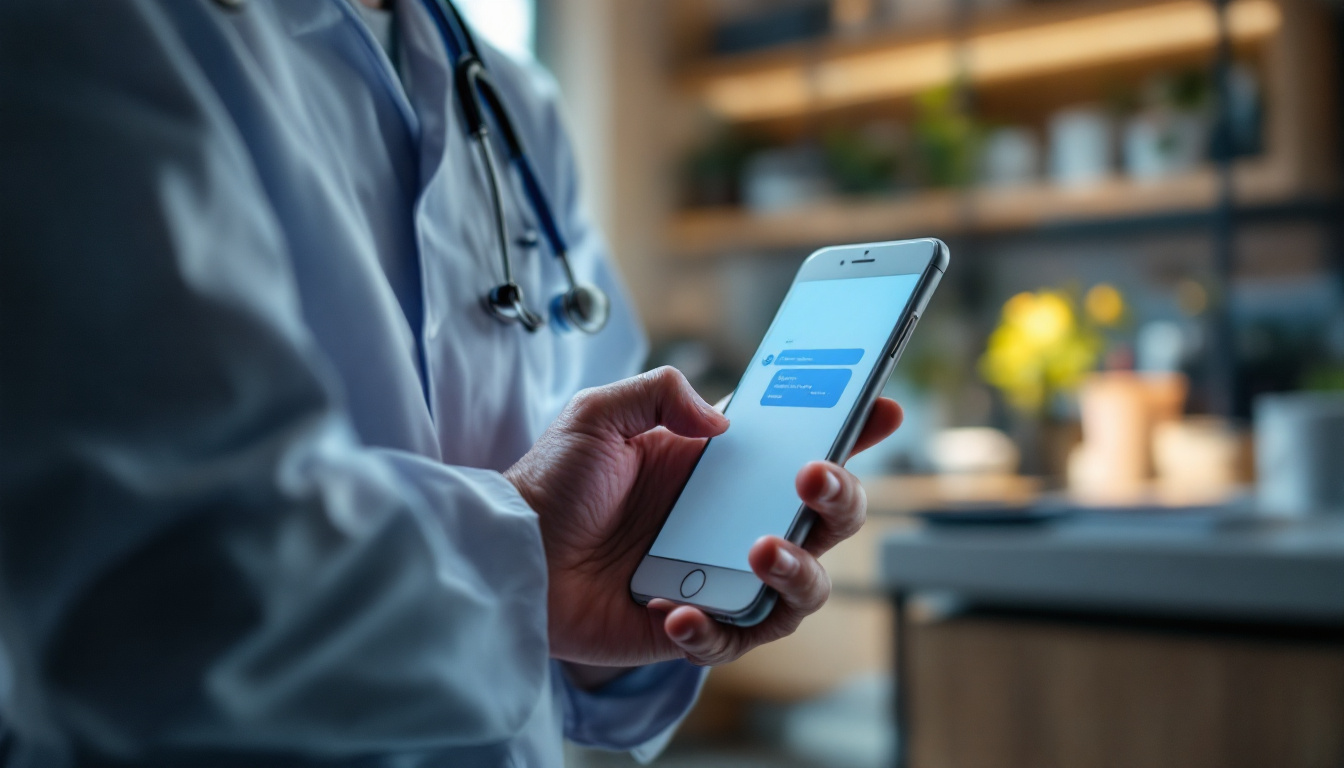As the healthcare industry continues to evolve, the adoption of advanced technologies is becoming increasingly essential for improving service delivery. One such innovation, Rich Communication Services (RCS) business messaging, shows great promise in transforming communication within the sector, particularly when it comes to insurance claim assistance. By leveraging RCS, healthcare providers can enhance patient interaction, streamline operations, and significantly improve the insurance claim process.
Understanding RCS Business Messaging
RCS business messaging is designed to provide a more interactive and enriched communication experience compared to traditional SMS. It allows businesses to engage their users with multimedia content, quick replies, and rich features like carousels and buttons, facilitating a two-way conversation.
The Basics of RCS Business Messaging
Unlike standard text messages, RCS integrates features resembling those of popular messaging apps. This includes images, videos, and even location sharing, creating a more engaging experience for users. Additionally, RCS includes read receipts and typing indicators, helping users feel connected and informed during conversations.
RCS is built on existing mobile networks and works seamlessly across devices, ensuring that users receive messages irrespective of their operating system. This universal compatibility is especially beneficial in healthcare, where patients might use a variety of devices to communicate with providers. Furthermore, RCS supports the use of branded messaging, allowing businesses to maintain their identity while communicating effectively with their audience. This branding capability not only enhances recognition but also builds trust, as users can easily identify messages from legitimate sources.
The Evolution of RCS Business Messaging
Originally conceived as a solution to enhance SMS communication, RCS has undergone significant evolution since its inception. Over the years, telecommunications companies and tech giants have collaborated to establish RCS as a standard feature across mobile devices worldwide. This collaboration has led to the development of a robust infrastructure that supports a wide array of functionalities, making RCS a preferred choice for businesses aiming to modernize their communication strategies.
As RCS continues to grow in popularity, its applications across various sectors, including healthcare, are being explored. Its capability to facilitate real-time communication and its support for rich media content positions RCS as a valuable tool for healthcare providers looking to enhance patient interactions and operational efficiencies. For instance, RCS can be utilized for appointment reminders, medication adherence notifications, and even telehealth consultations, where visual aids can significantly improve patient understanding and engagement. The potential for RCS to streamline communication processes not only benefits healthcare providers but also empowers patients, giving them greater control over their health journeys and access to vital information at their fingertips.
The Role of RCS Business Messaging in Healthcare
The healthcare industry is known for its complex communication requirements, from appointment scheduling and reminders to handling insurance claims. RCS business messaging plays a pivotal role in meeting these needs by streamlining communication and making it more interactive.
Improving Patient Communication
One of the most significant benefits of RCS business messaging is its ability to enhance patient communication. With RCS, healthcare providers can send appointment reminders, personalized health tips, and follow-up messages that can include videos, images, and links to educational resources.
This enriched communication method helps to engage patients more effectively and provides them with necessary information in a format that is easy to understand. Consequently, patients are more likely to adhere to their treatment plans and maintain regular communication with their healthcare providers.
Additionally, RCS can facilitate two-way communication, allowing patients to ask questions or express concerns directly through the messaging platform. This immediacy fosters a sense of connection and support, which is crucial in healthcare settings where patients may feel anxious or overwhelmed. By providing a channel for real-time dialogue, RCS not only empowers patients but also enables healthcare providers to address issues promptly, enhancing overall patient satisfaction and trust in the healthcare system.
Streamlining Healthcare Operations
RCS also helps in streamlining healthcare operations by facilitating efficient communication between providers and patients. Quick reply buttons and interactive elements allow patients to respond to messages swiftly, reducing the time spent on back-and-forth communication.
Moreover, RCS can immensely reduce no-show rates for appointments by sending dynamic reminders that can be easily confirmed or rescheduled. This proactive approach to patient engagement leads to better scheduling efficiencies and maximizes healthcare resources.
Furthermore, RCS can integrate seamlessly with electronic health records (EHR) systems, allowing for the automatic updating of patient information based on interactions. This integration not only saves time for healthcare staff but also ensures that patient records are current and accurate, which is vital for delivering high-quality care. By minimizing administrative burdens, RCS frees up healthcare professionals to focus more on patient care rather than paperwork, ultimately leading to improved health outcomes and operational efficiency.
Enhancing Insurance Claim Assistance with RCS
The insurance claim process often poses significant challenges for both patients and providers. RCS business messaging offers dynamic solutions to simplify this convoluted procedure, enhancing the overall experience.
Simplifying the Claim Process
With RCS, healthcare providers can deliver clear instructions regarding the insurance claim process directly to patients. This includes guidelines for completing necessary paperwork and submitting claims. Patients can receive visual aids or step-by-step guides as part of the messaging experience, making it easier to understand what is required.
Furthermore, RCS enables real-time communication between healthcare providers and insurers, facilitating faster claim submissions and approvals. The interactive nature of RCS allows for immediate responses to questions and concerns, ensuring that patients receive timely assistance during their claim process. This immediacy not only alleviates patient anxiety but also reduces the administrative burden on healthcare staff, allowing them to focus on providing quality care rather than getting bogged down in paperwork.
Increasing Transparency in Insurance Claims
Transparency in the insurance claim process is critical for building trust between patients and healthcare providers. RCS fosters this transparency by enabling regular updates on the status of claims. Instead of waiting for a follow-up call or email, patients can receive timely notifications directly through their messaging application.
Additionally, RCS can provide patients with access to essential documents and information regarding their claims, enhancing their understanding of the process and any potential issues. This level of visibility empowers patients and promotes a smoother experience when navigating their insurance claims. Moreover, the ability to track the progress of their claims in real-time allows patients to feel more in control of their healthcare journey, reducing frustration and uncertainty. By integrating features such as FAQs and chatbots within the RCS framework, patients can quickly find answers to common queries, further streamlining the process and enhancing their overall satisfaction.
The Benefits of RCS Business Messaging in Healthcare
The integration of RCS business messaging into healthcare practice not only transforms patient communication but also yields substantial benefits for the overall process of healthcare delivery.
Improved Patient Satisfaction
Utilizing RCS business messaging leads to improved patient satisfaction by providing a more personalized and engaging communication experience. Patients appreciate receiving timely reminders, updates, and interactive content that caters to their specific healthcare needs.
Moreover, the ease of responding to messages and the immediate assistance that can be provided through RCS fosters a positive relationship between patients and providers. Satisfied patients are more likely to recommend their healthcare provider to others, further enhancing the reputation of the practice. This enhanced communication also empowers patients, allowing them to feel more in control of their healthcare journey. They can easily ask questions, clarify doubts, or seek additional information, which can significantly reduce anxiety and improve overall health outcomes.
Efficient Insurance Claim Resolution
RCS business messaging greatly improves the efficiency of insurance claim resolution. By simplifying the communication flow between patients, providers, and insurers, RCS minimizes delays and streamlines the entire claims process. The result is quicker resolution times and more satisfied patients.
This efficiency also translates into financial benefits for healthcare providers, as they can process claims faster and focus on patient care instead of being bogged down by administrative tasks. Furthermore, the ability to send and receive documents, such as claim forms or policy details, directly through messaging reduces the chances of errors and miscommunication, which are common pitfalls in traditional methods. As a result, healthcare organizations can allocate resources more effectively, ensuring that both patient care and administrative functions operate smoothly without unnecessary interruptions.
Future Prospects of RCS Business Messaging in Healthcare
As healthcare continues to embrace digital transformation, RCS business messaging is poised to play a larger role in shaping patient interactions and administrative processes. However, like any technology, it poses certain challenges that need to be addressed.
Potential Challenges and Solutions
One of the primary challenges with RCS business messaging is ensuring that all patients have access to the technology required to utilize it effectively. While most smartphones support RCS, there are still barriers to adoption for certain demographics, particularly older adults who may be less tech-savvy.
To address this challenge, healthcare providers can offer alternative communication methods for those who are unable to leverage RCS fully. Providing education and support around how to use RCS effectively can also help bridge the gap. Additionally, integrating user-friendly interfaces and ensuring that the messaging is intuitive can significantly enhance user experience, making it easier for patients of all ages to engage with their healthcare providers.
The Road Ahead for RCS in Healthcare
The future of RCS business messaging in healthcare looks promising, with more providers recognizing its potential to enhance patient care and simplify processes. As technological advancements continue to develop, we can expect RCS to evolve as a key tool for delivering timely, efficient, and personalized healthcare communication.
Moreover, RCS can facilitate proactive health management by enabling healthcare providers to send reminders for medication, appointments, and preventive screenings directly to patients. This not only improves adherence to treatment plans but also fosters a sense of accountability among patients. Furthermore, the rich media capabilities of RCS, such as images and interactive buttons, can be utilized to provide educational content, making it easier for patients to understand their health conditions and treatment options.
In addition, the integration of RCS with artificial intelligence could lead to even more personalized interactions. AI-driven chatbots could be deployed to handle routine inquiries, allowing human staff to focus on more complex patient needs. This combination of RCS and AI has the potential to revolutionize patient engagement, ensuring that individuals receive timely information and support tailored to their specific health journeys.
Take the Next Step in Healthcare Communication with nativeMsg
Ready to elevate your healthcare communication strategy? nativeMsg, the RCS Business Messaging Creator, empowers you to transform texting into interactive patient experiences. With our easy-to-use platform, you can create, send, and optimize RCS messages that enhance insurance claim assistance and patient engagement. Say goodbye to plain text and hello to rich, interactive conversations with images, videos, and more. Get Started today and unlock the potential of RCS Business Messaging for your healthcare organization.
Free Trial
Get Started With RCS
Business Messaging!
Unlock the power of RCS and revolutionize your customer engagement.





